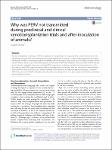Why was PERV not transmitted during preclinical and clinical xenotransplantation trials and after inoculation of animals?
Denner, Joachim
Porcine endogenous retroviruses (PERVs) are present in the genome of all pigs, they infect certain human cells and therefore pose a special risk for xenotransplantation using pig cells, tissues and organs. Xenotransplantation is being developed in order to alleviate the reduced availability of human organs. Despite the fact that PERVs are able to infect certain human cells and cells from other species, transmission of PERVs has not been observed when animals (including non-human primates) were inoculated with PERV preparations or during preclinical xenotransplantations. The data indicate that PERVs were not transmitted because they were not released from the transplant or were inhibited by intracellular restriction factors and innate immunity in the recipient. In a single study in guinea pigs, a transient PERV infection and anti-PERV antibodies were described, indicating that in this case at least, the immune system may also have been involved.
No license information

